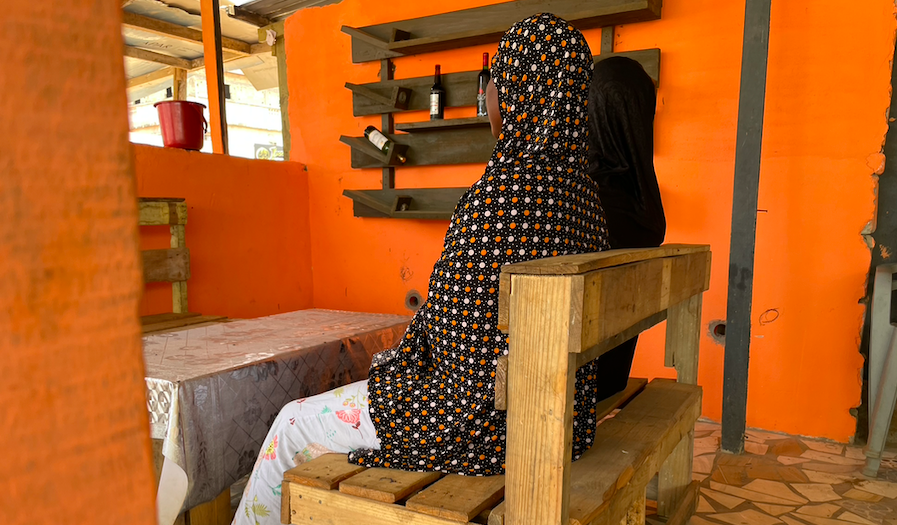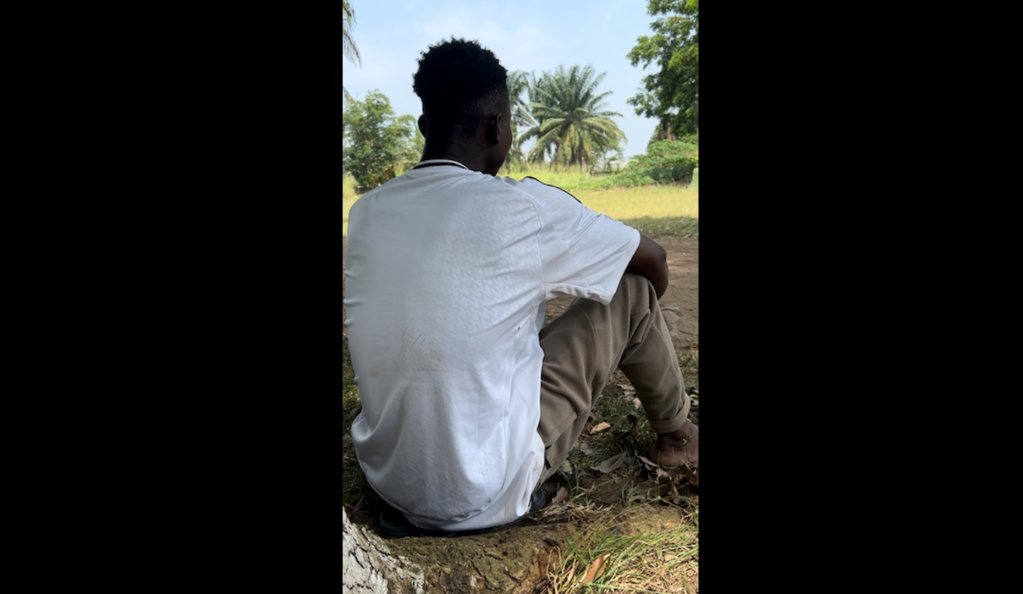In the Ivory Coast, the vast majority of those planning to immigrate irregularly to Europe hide their plans from their loved ones. The subject is taboo in the country. Many families therefore learn of the departure of a loved one the same day -- or several weeks after their sudden disappearance.
Aminata, 26, sells accessories, small cakes, and salads in a small street stall on the side of the road in Songon, one of Abidjan's suburbs. She walks toward us along a sandy city alley. The sun is at its peak. Sweat drips onto her forehead at the base of the long black veil covering her hair. The heat is stifling. "You don't have temperatures like this in Paris, that's why I want to come to your place," she jokes, lifting her veil to let some air through.
Aminata wants to go to France. A plan she shares with her "sister," her friend Kadi, who is three years younger than her. Together, they plan to head to Morocco and then cross into Europe. "I haven't told anyone, not my family, nor my friends," explains Aminata. "If you talk about going to Europe, people will discourage you." So the plan has become their secret.

But the journey is still poorly planned: the two friends plan to go to Morocco but are not sure how. Then, once there, they hope to "work a little" and "get a visa" for France. "That way, we won't have to cross the Mediterranean." A journey that seems so easy, listening to them.
"That's the tragedy of this kind of hidden immigration project," says Frédéric Agoussi, who works for Realic, an Ivorian association fighting irregular migration. He heard about Aminata's desire to leave. "Young Ivorians who want to travel almost always do so in secret, but many don't know what they're talking about; they don't do their research. They don't understand the reality of the journey."
Here, they're also called "Kaba Kaba" -- literally "those who go fast." "These young people think that Europe will offer them everything they don't have here. They're a generation in a hurry to make money in record time," Paul Adoté, chief of staff at Songon City Hall, explained to InfoMigrants. "Yet, we know, the journey is perilous."
Not once, in fact, does Aminata mention the desert crossing, the possible scams, the violence of smugglers, and the high risk of sexual abuse.
Read Also'Migrants abandoned in the Sahara Desert have no chance of surviving' -- Border Forensics
'I'll leave my children with my mother here'
A few meters further on, Durand also seems a little lost about the route to France. Yet, leaving Ivory Coast is a certainty. "I've dreamed of it since I was little," explains the 26-year-old scrap metal dealer and father of two children aged five and three. He, too, has kept his plans a secret. "I only told my parents about it in 2011, but they didn't have the money to help finance my trip. So I temporarily gave up. Now, I'm saving money every month to go."
Durand won't tell his children when he leaves. "I'll drop them off at my mother's," he says, shaking his head at the mention of the children's mother.

Why are these clandestine departures taboo, hidden? "That's just the way it is; it's ingrained in the Ivorian mentality," Frédéric Agoussi of the Realic association said. "There are strong superstitions here that say that when an immigration plan is made public, there's a strong chance it won't succeed. There's also a very strong belief in 'witchcraft,' a malevolent spirit that could cast a spell on your travel plans." Finally, there's the fear of being discouraged by loved ones, "especially mothers.”
The legal route is not an option for this group, often poorly educated, and therefore unlikely to qualify for a visa. "Refusals are so numerous that young people don't even try to apply for one anymore," Frédéric Agoussi adds. Durand, for his part, had no idea that a legal option to come to France existed.
Koné also hasn't considered leaving by regular means. At 40, this Ivorian from Yopougon is gathering "the last funds" he needs for his trip to France, "within a month." He's been saving for four years "discreetly, to reach one million CFA francs" (around 1,500 euros). His wife doesn't know. "I'll tell her I'm taking the road, probably two days before. She'll probably be worried, but hey, life is about taking risks too."
Read AlsoTales from the Border (1/8): Senegal -- Crossing the vast Atlantic Ocean
'Eight of my friends died on the road'
Unlike Durand or Aminata, Koné knows his route: he wants to go through Libya, despite the known dangers that await Africans who venture into the country. Then take a dinghy to cross the Mediterranean, sail up Italy, and reach France. "Death is natural," he smiles, a touch provocatively. "I know a lot of people who have left. Yes, sometimes it goes badly. Eight of my friends died on the road."
The departure points are well-known and are located "mainly in Daloa," in the center of the country, or in the municipalities of Anyama, Abobo, or Yopougon, on the outskirts of Abidjan's city center, Frédéric Agoussi listed out. "Young people know that in these areas, they will find contacts, smugglers."
These departures have also become a political concern for Abidjan's municipalities, which are increasing the number of workshops and outreach campaigns to meet these young people seeking to leave, according to the Songon town hall. "The government is working hard to retain its young people, to tell them that there is a social ladder for them too," Paul Adoté, Songon's chief of staff, told InfoMigrants.
Read Also'The Cursed': Former migrants rejected by society on return to Ivory Coast
But in Abidjan, stories of "hidden immigration" abound. Everyone seems to know someone who took to the road without telling anyone and disappeared one fine morning. "I just found a family member 13 years after she suddenly left," a colleague of Frédéric Agoussi, who is walking alongside us in Songon, said. "We thought she was dead, we had organized a funeral, and then last week, she finally reappeared, she returned home."
Others are confronted with more tragic stories. "I learned of the death of a loved one. He had hidden his departure. Apparently, we heard that a fight had broken out on the road, in the middle of the desert, and he stayed there..." a civil servant we met at the city's sub-prefecture recounted.
This is also the burden of Mariam, who lost her daughter Zineb in a shipwreck in the Mediterranean in 2022. The 20-year-old woman left one morning without saying anything, leaving her four-year-old son behind. By the time she realized where her daughter wanted to go, it was too late. Zineb was already in Tunisia and preparing to go to Libya. "She always picked up when I called her. Then one day, nothing. No answer. So I finally called her smuggler. He told me, 'There was a problem at sea...' And she stayed there."
